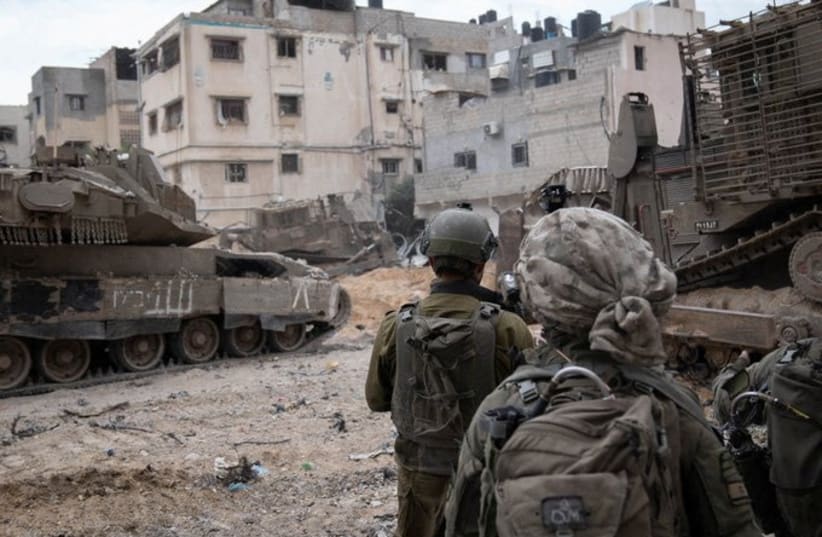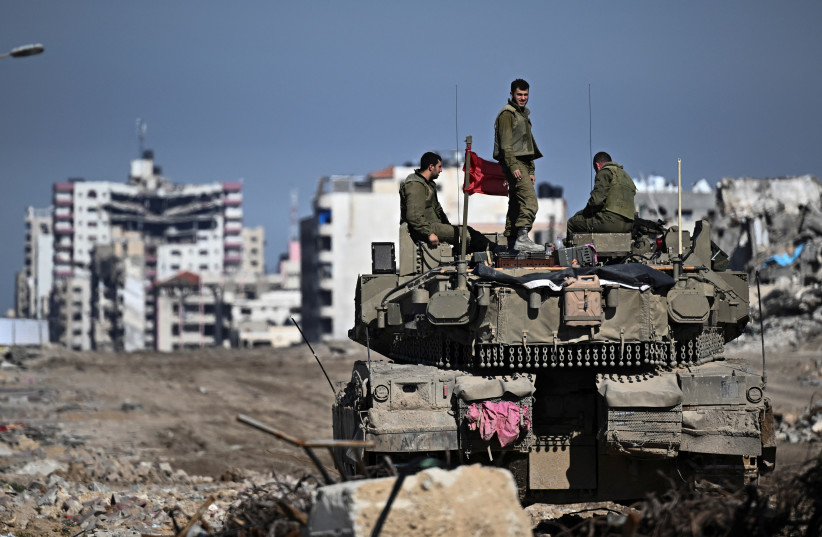Israel is indeed winning the war – just not the way you might think.
In October, the government set unrealistic goals. It would have been wiser to be more modest with those military objectives.
But the fact remains that if the government had set more reasonable goals, and if one were to ask if these goals were desirable and achievable, Jerusalem would have quite a few triumphs to date.
80% of Hamas’s organized military eliminated
With or without Rafah, the IDF has taken apart 19 out of the 24 existing Hamas battalions, killed around 14,000 terrorists, wounded potentially close to a similar number, and arrested thousands more.In purely quantitative terms, there are still maybe 30% or more Hamas foot soldiers who faded into the civilian population. But, as a unified and organized combat terrorist group, the IDF demolished the vast majority of Hamas’s military force.
In all of the previous rounds with Hamas, the highest number of terrorists ever killed by Israel was just over 1,000. The blow that Hamas has suffered is not worse than in the past but is of a whole different order of magnitude.
Majority of rockets stopped
Hamas succeeded in firing 14 rockets at soldiers in Gaza on Sunday; there hasn’t been a time since October when there was zero rocket fire for a full month. However, no rockets have been fired beyond the South since January, and even those have been few and far between.Sometimes, there was a full week that saw zero rockets fired, while in most cases, only one or two shots were fired, and these landed on open fields near the border. Meaning that beforehand, in past rounds, regardless of whatever strikes Israel launched against Hamas, the terrorist group maintained the capability to fire long-range rockets against nearly any Israeli target. Hamas’s rocket power was so versatile that it was assumed that the IDF couldn’t stop it.But now, this is a doctrine the IDF has mostly proved false. Hamas has lost many of its pre-war capabilities and likely will not be able to regain them again for years to come, if not longer.
Hamas is no longer a threat, invasion-wise
At press time, 20% of Hamas still exists at the organization level. Even if the IDF takes apart the remaining five battalions – most of which are in Rafah – somewhere between 3,000 and 10,000 Hamas members will probably remain at large, hiding among civilians.However, they are incapable of organizing a collective fight against the IDF within Gaza, let alone an offensive maneuver. This is not a case of disrespect or arrogance such as when the IDF improperly disregarded Hamas’s 35,000 or more fighters before October 7.Now, the IDF made sure that Hamas’s military force has indeed been taken apart. This does not mean that Hamas could never invade again; to ensure that, the IDF would have to permanently maintain a much larger standing army on all borders. But, at least for the coming years, this specific threat will be nondescript.
A security zone
One of the reasons Hamas cannot invade and its threat will be reduced in the coming years is that the IDF established a new security zone running along the entire Gaza border. Kilometers of houses have been flattened to make it easier for the IDF to track any physical movement, let alone any infiltration attempt. This also made it harder for Hamas to organize any military logistics close to the border under the cover of an urban setting.
Residents returning to the South
Many residents may not return for months or even longer, especially in towns that were physically destroyed on October 7, and will need longer to recuperate. The vast majority of residents have returned or are in the process of returning, a result of the large-scale elimination of Hamas’s invasion and rocket threats.
Elimination of Hamas tunnels
In 2014, Israel completed its largest elimination of Hamas tunnels – approximately 31. This was considered a major accomplishment, but the IDF did almost nothing to target Hamas’s deep internal Gaza network, nor any of the ones in Khan Yunis.
This time around, the IDF has destroyed dozens of kilometers of attack, defense, and strategic tunnels throughout Gaza in both the north and south. For the coming months and likely years, it will be much harder for Hamas to organize, smuggle, or accomplish anything significant militarily, because it has lost so much of its tunnel network assets. The network is far from destroyed – that could take years – but it has finally been hit in a significant, unprecedented way.
Hostage crisis
Israel has recovered, mostly in the hostage deal back in November and in operations, over 80 of the original 253 hostages who were captured.To the Israeli public, this has registered mostly as a failure because it is only around one-third of the original number; but it is still far greater than zero.More importantly, it was never a realistic goal to return all of the hostages at once. Many were killed on October 7 and their status was unknown until they were confirmed dead. The debates rage about how Israel should have conducted its invasion, and whether the government should have cut an earlier deal as opposed to holding out for better terms now into May, but no serious political contenders opposed invading Gaza. The invasion would have been an ironclad turning point, endangering the lives of the remaining hostages.None of these should take away from the damages of the war and the government’s shortcomings.
Government shortcomings
• The question as to why the invasion was dragged out over several months instead of it happening quickly by entering all of Gaza all at once is a serious one. This may have been a grave, strategic mistake. Maybe the war could have been much shorter.• Hamas has not been eliminated by Israel’s operations. It may be in the future, but it is not close at all to being gone because Hamas is both a political and a military movement and almost nothing has been done to replace the political or social aspect of it.• Along with the 80 hostages rescued, approximately 100 hostages are presumed dead, and around 70 are still held by Hamas. The widespread expectation was that an extensive invasion would have returned a much higher percentage, whether by negotiation or special operation rescues. But there have only been two such rescues to date.• The government ignored the day-after issue, which would have included a proper replacement for Hamas. Without such a plan, Hamas continued to rally for three more months after it was defeated in early February in Khan Yunis. This was precious time wasted, time that Israel will not get back. The replacement options are not perfect, but they are all better than Hamas; the government’s indecision decided for it.• The sheer length of the war was not properly calculated by the government in terms of the toll it would take on Israel’s relationship with the US, its global legitimacy, and specifically, threats from the International Criminal Court.This is all without getting into questions about a new front in the North with Hezbollah.But after these shortcomings, other than the Day After mess and maybe that some dozens more hostages could have been freed somehow (probably there would have been legitimacy problems even with a shorter war), the largest problem for understanding the war as a success or failure is that the government over-promised.Hamas can be eliminated through years of war and the placement of an alternative in its stead that will cover all of its bases, along with a new diplomatic solution supported by Israeli allies.But the war itself was never going to accomplish this, and there was no scenario where all the hostages would be released. So, the government did not achieve its stated goals, and there have been errors and squandered opportunities along the way. The act of not replacing Hamas in Gaza could squander more achievements in the future, a fact that is still in play.However, if the question is, did Israel radically improve its security situation vis-a-vis Hamas, compared to all prior rounds of conflict – the answer is unquestionably yes, and then some.

